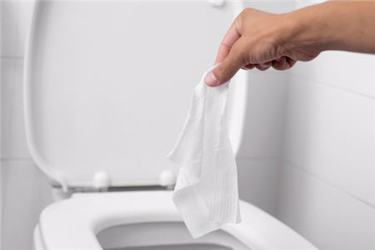Will Coronavirus Bring Non-Flushable Wipes Into Wastewater Systems?


Among the surge in infected patients and quarantine orders, the current coronavirus epidemic may also introduce the rise of a less expected consequence: non-flushable wipes clogging wastewater systems.
As Americans disinfect their homes with baby wipes, antibacterial towelettes, and other sanitary products that purport or are wrongly thought to be flushable, they are introducing products that cannot be broken down in sewer systems and ultimately clog them.
“Many Americans seem to be following the recommendations of public health officials to clean and sterilize countertops, doorknobs, faucets and other frequently touched surfaces in their homes,” The New York Times reported. “The result has been a coast-to-coast surge in backed-up sewer lines and overflowing toilets, according to plumbers and public officials, who have pleaded with Americans to spare the nation’s pipes from further strain.”
The issue of non-flushable wipes causing damage to wastewater systems has been an ongoing one. It has inspired high-level inter-agency partnerships in the U.S. and special standards in the UK — where globules of collected wipes in wastewater systems are known as “fatbergs.”
But the problem has taken on new urgency as COVID-19, the disease caused by coronavirus, spreads. For instance, the California State Water Resources Control Board (CSWRCB) has released a news advisory urging residents not to flush disinfecting wipes or paper towels.
“While the State Water Board and other public agencies encourage Californians to follow the Centers for Disease Control recommendations to clean surfaces with disinfecting wipes to reduce the spread of COVID-19, it is important to discard those items in the trash, not the toilet,” per CSWRCB. “Flushing wipes, paper towels and similar products down toilets will clog sewers and cause backups and overflows at wastewater treatment facilities, creating an additional public health risk in the midst of the coronavirus pandemic.”
Though an influx of non-flushable wipes doesn’t seem to have irreversibly damaged any of the nation’s wastewater systems so far, without an end to the COVID-19 epidemic in sight, more warnings like CSWRCB’s may be prudent. Of course, it would be better to address the problem before it compounds.
“The water board has issued this advice in a heightened interest to keep things operational. We’re bracing for it in case it becomes a cumulative problem,” Bill Winter, assistant deputy director of L.A. County Public Works, told the Los Angeles Times. “The best advice for wipes disposal is to put them in the trash.”
To read more about how wastewater systems deal with non-flushable wipes, visit Water Online’s Flushables Solutions Center
